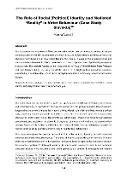| dc.contributor.author | Švecová, Martina | |
| dc.contributor.editor | Carrilho, Kleber | |
| dc.contributor.editor | Horsmanheimo, Laura | |
| dc.contributor.editor | Linnamäki, Katinka | |
| dc.date.accessioned | 2024-07-31T16:16:08Z | |
| dc.date.available | 2024-07-31T16:16:08Z | |
| dc.date.issued | 2024 | |
| dc.identifier.uri | https://hdl.handle.net/20.500.14178/2563 | |
| dc.description.abstract | The study examines why voters in Slovakia's corruption-ridden political landscape continue to supportpoliticians with criminal ties, despite extensive media exposure of their misconduct. Drawing from LilianManson's 'Uncivil Agreement: How Politics Became Our Identity', it suggests that emotional bonds andsocial identities often override rational evaluations, with media representation of political figures playinga pivotal role. The analysis focuses on the representation of Slovak Prime Ministers Peter Pellegriniand Igor Matovič during the early COVID-19 pandemic, highlighting how journalistic practices,intensified by a multiplier effect, shape public perceptions and impact democracy in Central and EasternEurope. | en |
| dc.language.iso | en | |
| dc.publisher | University of Helsinki | |
| dc.relation.url | http://hdl.handle.net/10138/578882 | |
| dc.rights | Creative Commons Uveďte původ-Neužívejte dílo komerčně 4.0 International | cs |
| dc.rights | Creative Commons Attribution-NonCommercial 4.0 International | en |
| dc.title | The Role of Social (Political) Identity and Mediated “Reality” in Voter Behaviour (Case Study Slovakia) | en |
| dcterms.accessRights | openAccess | |
| dcterms.license | https://creativecommons.org/licenses/by-nc/4.0/legalcode | |
| dc.date.updated | 2024-07-31T16:16:08Z | |
| dc.subject.keyword | balance analysis | en |
| dc.subject.keyword | emotions | en |
| dc.subject.keyword | hostile media effect | en |
| dc.subject.keyword | media discourse | en |
| dc.subject.keyword | representation | en |
| dc.subject.keyword | social identity | en |
| dc.subject.keyword | self-categorization theory | en |
| dc.subject.keyword | sentiment analysis | en |
| dc.publisher.publicationPlace | Helsinki | |
| dc.relation.fundingReference | info:eu-repo/grantAgreement/MSM//SVV260730 | |
| dc.date.embargoStartDate | 2024-07-31 | |
| dc.contributor.organizer | Helsinki Hub on Emotions, Populism and Polarisation | |
| dc.type.obd | 57 | |
| dc.type.version | info:eu-repo/semantics/publishedVersion | |
| dc.identifier.obd | 649649 | |
| dc.subject.rivPrimary | 50000::50800::50802 | |
| dc.description.edition | 1. | |
| dcterms.isPartOf.name | Working Papers in Emotions, Populism and Polarisation | |
| dcterms.isPartOf.eissn | 2737-3657 | |
| dcterms.isPartOf.journalYear | 2024 | |
| dcterms.isPartOf.journalVolume | 3 | |
| dcterms.isPartOf.journalIssue | 1 | |
| dcterms.isPartOf.isbn | 0-000-00000-0 | |
| dcterms.isPartOf.series | Working Paper Series, 2024 Volume 3, Issue 1 | |
| uk.faculty.primaryId | 118 | |
| uk.faculty.primaryName | Fakulta sociálních věd | cs |
| uk.faculty.primaryName | Faculty of Social Sciences | en |
| uk.department.primaryId | 330 | |
| uk.department.primaryName | Katedra mediálních studií | cs |
| uk.department.primaryName | Department of Media Studies | en |
| uk.department.secondaryId | 320 | |
| uk.department.secondaryName | Institut komunikačních studií a žurnalistiky | cs |
| uk.department.secondaryName | Institute of Communication Studies and Journalism | en |
| uk.event.name | The Working Paper Series on Emotions, Populism and Polarisation | |
| dc.description.pageRange | 141-158 | |
| dc.type.obdHierarchyCs | PŘÍSPĚVEK V KONFERENČNÍM SBORNÍKU::příspěvek v konferenčním sborníku::příspěvek v recenzovaném konferenčním sborníku | cs |
| dc.type.obdHierarchyEn | PAPER IN CONFERENCE PROCEEDINGS::article in proceedings::article in reviewed proceedings | en |
| dc.type.obdHierarchyCode | 57::148::499 | en |
| uk.displayTitle | The Role of Social (Political) Identity and Mediated “Reality” in Voter Behaviour (Case Study Slovakia) | en |

